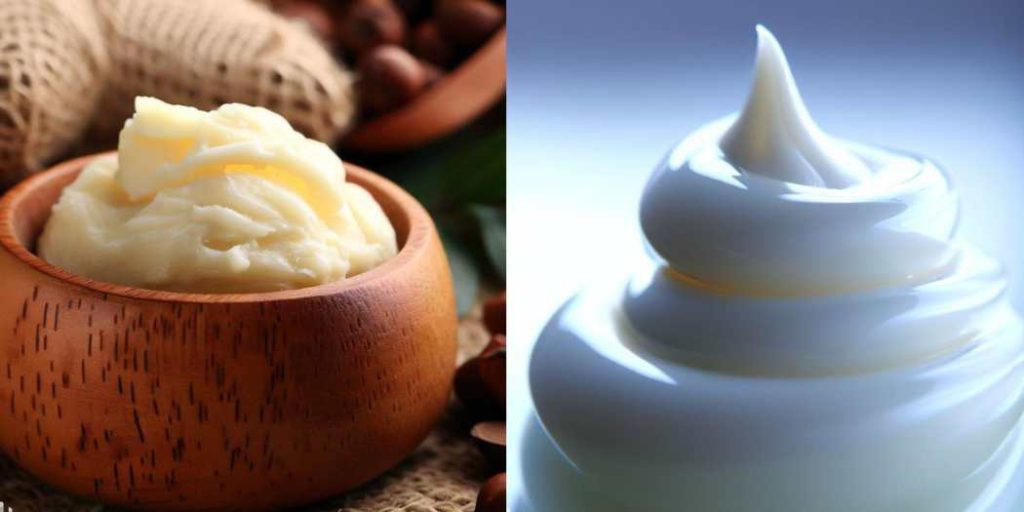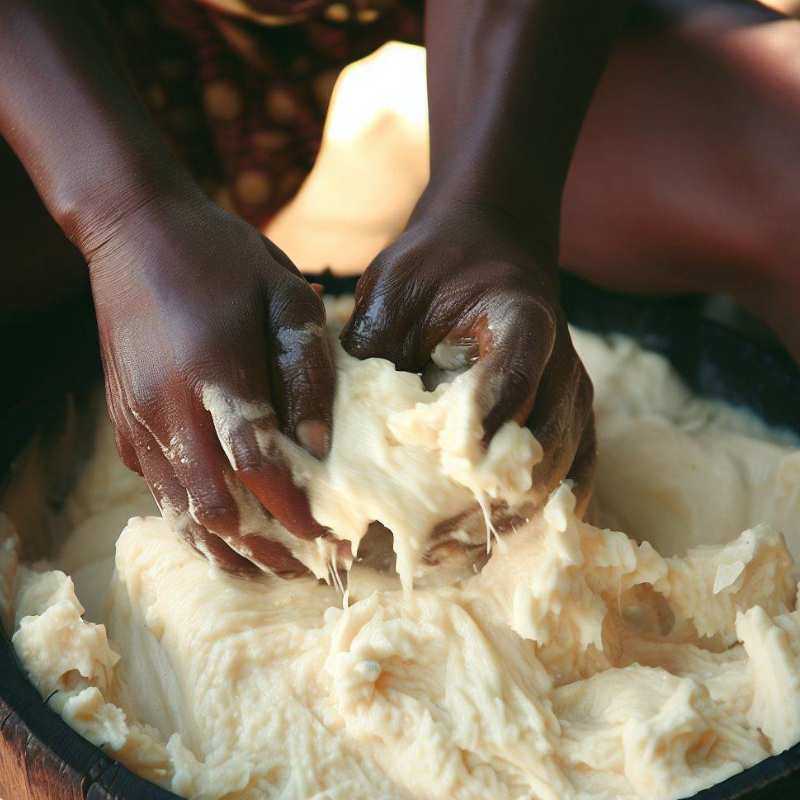Shea Butter vs Lotion: A Skincare Showdown
Is shea butter better than lotion?
Whether shea butter is “better” than lotion depends on your specific skin needs. Shea butter is rich in vitamins and fatty acids, making it a great natural moisturizer, especially for dry skin. However, lotions often include a variety of ingredients, like humectants and emollients, and can be formulated to address specific concerns like aging, acne, or sun protection.
In general, shea butter could be better for intensive hydration, while lotion might be better for specific skin concerns.
Check my Shea butter warnings article.

Hello, radiant beings! We’re embarking on a joyous journey through the enchanting world of skincare. In our magical exploration, we’ll dive deep into two skincare superheroes: shea butter and lotion. Let’s unlock the secrets of these skin-nourishing champions!
Introduction
First, let’s meet our contenders. Shea butter, a luxurious natural product, is generously provided by the African shea tree. Picture a lush, nourishing balm that feels like a mini-holiday for your skin. Shea butter is loaded with vitamins and fatty acids, creating an ultra-hydrating experience that leaves your skin feeling pampered and radiant.
Lotions, on the other hand, are the wardrobe of skincare. They come in countless varieties, each with its unique formula designed to cater to different skin types and conditions. It’s like having a bespoke skincare collection that caters to your every whim and fancy!
Composition
Shea Butter
Shea butter is the epitome of simplicity, yet it’s anything but basic. Its remarkable composition, rich in vitamins A and E, makes it an outstanding natural skincare ally. These vitamins not only nourish the skin but also help combat oxidative stress, which contributes to the aging process. Shea butter, in essence, is a wellness retreat for your skin!
Lotion
Now, imagine lotions as the cocktail party of skincare – each one carefully mixed with ingredients to address specific skin needs. Some lotions have hydrating heroes like hyaluronic acid, while others pack in powerhouses like retinol to fight the signs of aging. There are even lotions designed to combat acne, filled with ingredients like salicylic acid.
Benefits
Shea Butter
If your skin is crying out for moisture, shea butter is there to the rescue! Its exceptional moisturizing capabilities come from its ability to create a natural barrier on the skin, effectively sealing in hydration. This makes shea butter an excellent choice for those dry winter months when your skin needs an extra boost of moisture.
| Component | Role in Skincare |
|---|---|
| Oleic Acid | Provides deep hydration and replenishes fatty acids in the skin. |
| Stearic Acid | Helps to maintain the skin’s moisture barrier and protect against water loss. |
| Linoleic Acid | Aids in reducing inflammation and acne while increasing skin’s moisture levels. |
| Palmitic Acid | Acts as an emollient, softening the skin without leaving a greasy residue. |
| Vitamin A | Known for its anti-aging properties, it boosts collagen production and reduces the appearance of fine lines and wrinkles. |
| Vitamin E | A potent antioxidant, it protects the skin from damaging free radicals and environmental stressors. |
Let’s delve deeper into each of these components:
- Oleic Acid: This fatty acid is a key player in maintaining skin’s health. It penetrates the skin’s surface easily, providing deep hydration and replenishing the fatty acids that naturally occur in your skin. This helps to keep your skin supple and glowing.
- Stearic Acid: An essential ingredient for our skin, stearic acid helps to form a protective barrier on the skin’s surface. This barrier not only locks in moisture but also shields your skin from environmental aggressors like wind and pollution.
- Linoleic Acid: This wonder ingredient is fantastic for those prone to breakouts. Linoleic acid can help to reduce inflammation, making it a fantastic ally against acne. Moreover, it aids in maintaining the skin’s natural moisture balance.
- Palmitic Acid: While aging, our skin’s natural production of palmitic acid decreases. Applying it topically through products like shea butter can help to soften the skin, providing a smooth texture without leaving a greasy residue.
- Vitamin A: Also known as retinol, vitamin A is renowned for its anti-aging properties. It can boost collagen production, reducing the appearance of fine lines and wrinkles, and improving skin’s overall elasticity.
- Vitamin E: This potent antioxidant is a true hero for our skin. Vitamin E helps to protect the skin from damaging free radicals and environmental stressors like UV rays and pollution. It also aids in skin healing, making it great for scar reduction and overall skin health.
Each of these components in shea butter works in synergy to nourish and protect your skin, keeping it radiant and healthy.
Lotion
Lotions definitely deserve a standing ovation for their versatility! With such a broad range available, you can find a lotion to tackle virtually any skin concern. From hydrating dry skin to soothing sensitive skin and even addressing signs of aging, lotions have got you covered.
Check my article can you use Shea butter for fungal acne? and my Shea butter salve recipe.
Who Benefits Most from Shea Butter: A Detailed Look at Ideal Users and Concerns
If not sure if shea butter is a good alternative to body lotion, the below will be helpful:
- People with Extremely Dry Skin: Shea butter’s high concentration of natural vitamins and fatty acids make it incredibly nourishing and moisturizing for skin. It’s often used to remedy dry skin and to help protect the skin’s natural oils.
- Those with Eczema or Dermatitis: The rich texture and anti-inflammatory properties of shea butter can be helpful for people suffering from skin conditions like eczema or dermatitis, as it can provide soothing relief.
- People Living in Harsh Climates: For those living in cold, windy, or dry climates, shea butter can provide a protective barrier against environmental aggressors and prevent moisture loss.
- Individuals with Mature Skin: Shea butter contains natural antioxidants like vitamins A and E, which can help combat signs of aging. People with mature skin may find it beneficial for its potential to smooth fine lines and wrinkles and improve skin elasticity.
- People with Sensitive Skin: Shea butter is typically suitable for sensitive skin. It’s free from many common irritants found in many body lotions, such as fragrances and preservatives.
- Individuals Prone to Scarring: Shea butter can promote skin regeneration and improve the appearance of scars due to its Vitamin E content.
- Those Seeking a Natural Alternative: People who prefer using natural or plant-based products may choose shea butter over lotions that often contain synthetic ingredients.
Remember, everyone’s skin is different, and what works for one person may not work for another. It’s always recommended to do a patch test before trying a new product, even one as generally skin-friendly as shea butter.
Drawbacks
Shea Butter
Despite its many perks, shea butter may not be everyone’s cup of tea. For those with oily skin types, shea butter might feel a little heavy, potentially leading to clogged pores. Plus, it lacks the targeted benefits that some specialized lotions can offer, which might be a downside for some.
Lotion
Lotions, despite their versatility, can be a double-edged sword. Some may contain artificial fragrances or other irritants that can upset sensitive skin. Plus, they might not provide the deep, intensive moisture needed for severely dry skin, making them less than ideal in certain circumstances.
The Unmatched Allure of Natural Products

Embracing natural products like shea butter is like celebrating a harmonious reunion with Mother Nature herself. It’s about simplifying our skincare routine, shedding unnecessary synthetic additives, and surrendering to the potent power of the Earth’s botanical treasures. Shea butter, in its raw, unrefined glory, is a testament to this philosophy. This golden butter is 100 percent natural, extracted from the nut of the African shea tree without the need for any chemical processing.
Using shea butter is like painting your skin with a palette of nature’s best nutrients. It’s about nourishing your skin with the simplicity and purity of a single, magical ingredient. Every time you apply shea butter, you’re not just hydrating your skin—you’re experiencing the wisdom of centuries-old skincare traditions, and respecting the natural rhythms of your body.
Turning to natural products is a beauty statement—it means choosing authenticity over artificiality, and sustainability over short-term trends. So when you choose to use shea butter, you’re not just making a choice for beautiful skin. You’re also choosing a healthier, more balanced relationship with the world around you. And that, radiant beings, is a truly beautiful choice to make.
Conclusion
So, who wins the crown in the Shea Butter vs Lotion face-off? Well, the truth is, they both do! Shea butter is a wonderful choice for deep, intensive hydration, while lotions offer customizable skincare solutions tailored to specific skin concerns.
Remember, the best skincare routine is the one that your skin loves and makes you feel absolutely fabulous!
As with all things skincare, listening to your skin is key.
Happy pampering.
Resources
- Lin T-K, Zhong L, Santiago JL. Anti-Inflammatory and Skin Barrier Repair Effects of Topical Application of Some Plant Oils. Int J Mol Sci [Internet]. 2017 [cited 2023 May 30]; 19(1):70. Available from: https://www.ncbi.nlm.nih.gov/pmc/articles/PMC5796020/.
- Shea Butter – an overview | ScienceDirect Topics [Internet]. [cited 2023 May 30]. Available from: https://www.sciencedirect.com/topics/agricultural-and-biological-sciences/shea-butter.
